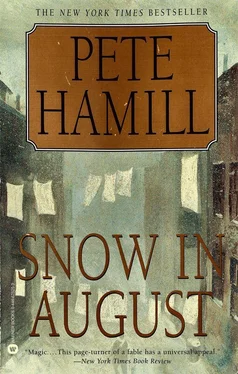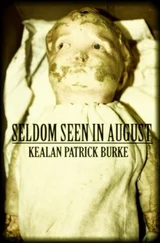She paused, squinting at a page. Michael sipped his tea, but it had a metallic taste and he wished he could have a cup of Rabbi Hirsch’s brew.
“Let’s see. Washing yourself with snow, that means pain will go away. Eating snow, that’s you’re leaving home. But — was it the hot -water tap?”
“As a matter of fact, yes.”
“That’s good, maybe. Snow in a warm climate means good luck. But that’s not the same as a hot-water tap. Still, it’s close.”
She turned to another page.
“The bowler hat, the bowler hat. Let’s see… a man’s hat, that usually means, uh, emotional sorrow,” she said. “Losing your hat, that means watch out for false friends. A new hat is a sign of wealth. A big hat means joy and prosperity. But a bowler hat? Jeez, I dunno. Even Madame Zadora doesn’t get into bowler hats. You know anyone that owns one?”
“No. I’ve seen them in the movies, but never in real life.”
She looked hard at him now.
“You got a lot of things on your mind, don’t you, kid?”
“Yes.”
“I don’t blame you,” she said. “Everybody knows what happened to Mister G.” She sipped her tea. “And everybody knows Frankie McCarthy did it and could go up the river for a long stretch. Especially if you turned rat. So you’re worried about that, which it’s natural. And that’s in all the dreams, I guess, that worry . And the ghost walking through the rooms? That’s your father, Michael, God rest his soul. You wish he was here. You wish he could go with you and beat the crap out of that Frankie McCarthy.” She put out the cigarette. Michael counted six butts in the saucer. “But he’s not here. And you can’t run away.”
“So what do I do?”
“Pray,” she said. “And keep the faith. You believe hard enough things’ll work out, they will. Mark my words.”
That night, he didn’t dream. Each morning now, he prayed. He stayed alert to danger. And on the streets, nothing happened.
Michael was careful leaving the house. He watched the rooftops, fearful of falling bricks or garbage cans. He made certain the doors to the flat were always locked. He got permission from his mother to increase the wattage of the bulbs in the hallways. He took different routes through the parish on his journeys to see Rabbi Hirsch or to serve mass at Sacred Heart. Going to mass was always the easiest; Frankie McCarthy and the Falcons didn’t get up until noon.
Sonny tried to keep the three of them calm. From his aunt’s house next door to the Venus, he could see into the poolroom. Frankie was there, all right. Hour after hour. Smoking. Playing pool. Laughing with his boys. But Sonny never saw him go out on a patrol. Never saw him act as if he was looking for anyone.
“Maybe he figured out it’s not us,” Michael said.
“Nah,” Sonny said. “He’s a crafty prick. Like a snake. He knows if anything happens to us, the bulls will drop a fuckin’ subway car on him.” He chewed the inside of his mouth. “He’ll wait. He won’t forget.”
The boys waited too. They went to school. They played in the street. Michael stopped in the synagogue to learn new words and phrases. He added fressing to his vocabulary, meaning eating like a slob. A momser was a bastard, a son of a bitch. Latkes were potato pancakes, and the word for dirt was shmootz . But Frankie remained a presence in his mind, like a bad tooth in a jaw. Even when life seemed normal.
On the Sunday before Easter, while hundreds of people were strolling through the parish with palm crosses stuck in their lapels, Kate Devlin took Michael by subway to Orchard Street in Manhattan. The train was filled with women like her, taking their children to be outfitted for Easter. Most of them had saved for months to buy clothes, and the clothes on Orchard Street were the cheapest in New York. At the Delancey Street station, they emptied the train, and hundreds of them climbed the stairs, dragging their kids into the parish they all called Jewtown.
This was the first time that Michael had come to Jewtown with his mother, and he was excited by its jammed, narrow streets, tiny stores, bearded men, racks of clothing climbing ten feet above the sidewalks. He imagined himself into the Fifth Quarter in Prague. The ghetto. The air was pungent with strange odors. Men and women shouted back and forth in five or six languages. Music played from unseen radios, adding to the din. Everyone seemed to be bargaining, in a frazzled routine of declaration, rejection, compromise, fingers being used to emphasize numbers. Young men in yarmulkes, black pants and collarless white shirts, with straggly beards and sidecurls dangling over the ears, measured waists and chests and trouser lengths with worn yellow tapes, marked them with chalk, then shoved hanging clothes aside to allow a customer to stand before a mirror. Kids looked panicky at the sight of themselves in strange clothes. Mothers tugged at seams and felt the fabrics and told the kids to stand straight. Michael felt sure that if he stayed long enough he would see Rabbi Lowe. Or Brother Thaddeus, his baldness disguised with a wig.
For an hour, he and his mother examined suits and rejected them. Too expensive. Too cheesy. Too small. Too big. They went slowly up one side of Orchard Street and back down the other. At the corner, Michael gazed down Delancey Street and saw the dark, ugly outline of the Williamsburg Bridge, its towers crowned with knobby pronged spires. He thought: Prague . Rabbi Hirsch must have seen the spires of St. Vitus this way, as he walked from the ghetto toward Old Town Square. Except our tunnels are subway tunnels. Not the evil tunnels of Prague, where fanatics seethed and babies were strangled in the dark. Here on Orchard Street, Michael thought, he was even safer than a Jew in the ghetto. Here, Frankie McCarthy would never find him.
Then his gaze fell upon a dark blue suit hanging just above sidewalk level in a small store across the street. Neat lapels, dark buttons. That was the suit he could wear when he was twelve. It would be fine for Easter, but it would be better after he turned twelve. In that suit, he would look older: thirteen, maybe even fourteen. In that suit, he could start looking like a man.
“Look at that one, Mom,” he said, and led her through the crowds, suddenly anxious that someone else might find it first. A young clerk came out. His face was very thin, framed with red hair; he was wearing a yarmulke. Kate Devlin touched the fabric and asked the price.
“For you, fourteen dollars,” the young man said, in an accented voice.
“It’s very dear,” she whispered to Michael.
“Es iz zaier taier,” Michael said.
The clerk looked startled.
“You’re Jewish?”
“No,” Michael said. “Irish.”
“Irish? Ah, ains fun di aseres hashvotim . One of the lost tribes.” The clerk laughed.
“Three dollars off!” he said, lifting down the suit.
“You’re kidding,” Kate Devlin said.
“Three and a half,” the clerk said. “You are die mutter ?”
It sounded like mooter , but she understood.
“Yes,” she said, and smiled uneasily. “Can he try it on?”
“Yes, yes. In there.” He pointed to a dark niche burrowed among clothes. Then to Michael: “Your mother wants ain glazel tai ?”
“Mom, you want a glass of tea?”
“That’d be nice,” she said.
“Mit tzuker?” the clerk said.
“Bitte,” Michael said, knowing his mother took sugar with her tea. “Zait azoy gut.”
While Michael changed, the clerk pushed through the bunched clothes and disappeared into a deeper part of the shop. Michael emerged first. The suit fit almost perfectly. His mother made him turn around, and nodded approval. He pushed aside some clothes and saw himself in a cracked mirror. It was like gazing at a stranger. Maybe even a sixteen-year-old stranger.
Читать дальше












